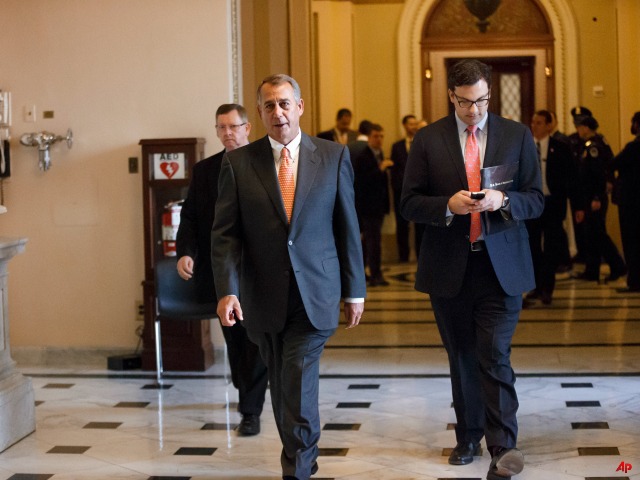
On Wednesday, the House of Representatives passed the 1,582 page omnibus spending bill worth more than a trillion dollars of spending to accompany the recently-passed budget deal.
The deal came up for the vote in the House less than two full days after it was introduced Monday evening, meaning that many of the members who voted for it likely did not read it.
The vote overwhelmingly passed the House with a total vote count of 359-67. Only three Democrats – Reps. Rush Holt (D-NJ), Raul Grijalva (D-AZ), and Mike McIntyre (D-NC) – voted against it, while 64 Republicans did the same.
Those Republicans who voted against the omnibus bill include: Reps. Justin Amash (R-MI), Michele Bachmann (R-MN), Joe Barton (R-TX), Kerry Bentivolio (R-MI), Jim Bridenstine (R-OK), Mo Brooks (R-AL), Paul Broun (R-GA), Michael Burgess (R-TX), Bradley Byrne (R-AL), Steve Chabot (R-OH), Mike Coffman (R-CO), Tom Cotton (R-AR), Rick Crawford (R-AR), Steve Daines (R-MT), Ron DeSantis (R-FL), Jeff Duncan (R-SC), John Duncan (R-TN), Scott DesJarlais (R-TN), Trent Franks (R-AZ), Cory Gardner (R-CO) Scott Garrett (R-NJ), Phil Gingrey (R-GA), Louie Gohmert (R-TX), Paul Gosar (R-AZ), Ralph Hall (R-TX), George Holding (R-NC), Tim Huelskamp (R-KS), Sam Johnson (R-TX), Jim Jordan (R-OH), Steve King (R-IA), Jack Kingston (R-GA), Raul Labrador (R-ID), Doug LaMalfa (R-CA), Doug Lamborn (R-CO), James Lankford (R-OK), Billy Long (R-MO), Cynthia Lummis (R-WY), Kenny Marchant (R-TX), Tom Massie (R-KY), Tom McClintock (R-CA), Mark Meadows (R-NC), Markwayne Mullin (R-OK), Randy Neugebauer (R-TX), Richard Nugent (R-FL), Stevan Pearce (R-NM), Tom Petri (R-WI), Ted Poe (R-TX), Mike Pompeo (R-KS), Bill Posey (R-FL), Reid Ribble (R-WI), Dana Rohrabacher (R-CA), Matt Salmon (R-AZ), Mark Sanford (R-SC), Steve Scalise (R-LA), David Schweikert (R-AZ), Austin Scott (R-GA), Jim Sensenbrenner (R-WI), Jason Smith (R-MO), Adrian Smith (R-NE), Lee Terry (R-NE), Scott Tipton (R-CO), Randy Weber (R-TX), Brad Wenstrup (R-OH), and Roger Williams (R-TX).
Gosar, one of the GOP members who opposed the bill, said in a statement that he voted against the “massive spending bill” for a number of reasons, including that the bill:
…undermines the sound fiscal cuts we implemented in 2011 by increasing overall spending above 2014 sequester levels. I was sent to Congress to cut spending and work toward a balanced budget, not increase spending and balloon our national debt.
Second, this bill was conceived in a flawed process, which exemplifies dysfunctional Washington. This massive 1,582 page bill was written behind closed doors. There was no open debate. No amendments were allowed. We were given a measly 48 hours to read and digest its 1,582 pages. It is irresponsible to vote on enormous bills no one had time to read. When it comes to rushing bills through Congress, ObamaCare taught us an important lesson: we must demand time to air out legislation and have a conversation with the people who elected us.
Labrador, another conservative who voted against the bill, said, “Once again, Congress is kicking the can down the road, refusing to make the tough choices that are necessary to put our fiscal house in order and prevent a future debt crisis. The Omnibus is Washington at its worst – a 1,582 page bill stuffed with pork, ineffective programs and giveaways, being rushed through Congress without proper review.”
The omnibus spending bill is the second part of the budget deal House Budget Committee chairman Rep. Paul Ryan (R-WI) cut with Senate Budget Committee chairwoman Sen. Patty Murray (D-WA) in December. After that bill passed Congress and was signed into law by the president in December, House Appropriations Committee chairman Rep. Hal Rogers (R-KY) worked with Senate Appropriations Committee chairwoman Sen. Barbara Mikulski (D-MD) to develop this omnibus bill. The budget deal from Ryan and Murray offers broad outlines on spending, while the omnibus spending bill makes specific spending allotments to various government programs and agencies.

COMMENTS
Please let us know if you're having issues with commenting.